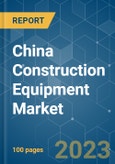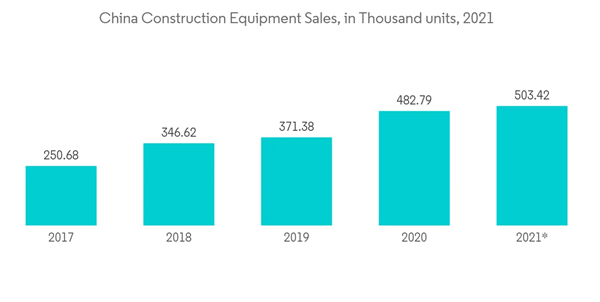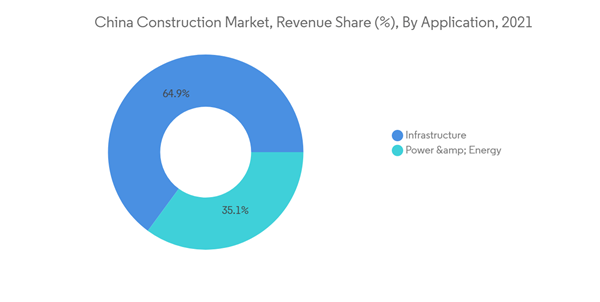The COVID-19 pandemic severely impacted the construction industry in China. The construction industry in China registered a decline of 6.9% during the first quarter of 2020. The manufacturing sector in China is a major consumer of construction equipment like wheel loaders and cranes. However, Purchasing Managers Index (PMI) fell to 49.4, indicating an economic slowdown since a PMI under 50 is considered to be a major sign of economic contraction in China. The disruptions in supply chain activities, the interruption in large-scale manufacturing, restrictions on travel, and the declining sales of equipment, are responsible for the declining growth of the market. The rise in construction across the country is observed after the pandemic due to the easing of restrictions in the country. The market is expected to cope with all the losses that happened during the pandemic and grow at a certain pace. . Furthermore, the manufacturers are implementing contingency plans to mitigate future business uncertainties to retain continuity with clients in the critical sectors of the construction equipment industry. For instance,
Key Highlights
- In 2020, Sany Heavy Industry increased its R&D investments to USD 954 million an increase of 33.2 % over 2019 and the number of R&D employees reached 5436 a 69% increase over 2019. Thus Sany Heavy Industry was able to luanch new innovative products like super-large excavators SY870, SY980 and SY1250, new-generation product line of intelligent excavators and 4000 t crawler crane SCC40000A which helped the company to arrest the decline in sales during the COVID-19 pandemic.
Over the long term, the increasing focus on infrastructure, the development of automation in the construction and manufacturing processes, and the introduction of electric construction equipment like elctric excavators is expected to have a significant impact on the growth of the market studied. The road construction machinery market witnessed a substantial increase in the due to the increased road development programs undertaken, such as the Belt and Road Initiative.
Besides being the largest manufacturer of construction equipment globally, China is the largest market for construction machinery in the world. Rural construction activities, rapid urbanization, and the growth in public-private partnerships drove the demand for construction equipment. China also has one of the best construction machinery supply chains in the world, with all parts of the supply chain being in China.
Renting and leasing construction machinery is on the rise. Buying new equipment involves high cost, maintenance, and storage-related issues. Renting is becoming a viable possibility for newer businesses as well. In fact, for short-term construction applications, renting machinery has been preferable to an original purchase among construction contractors, as renting allows optimum utilization of the machinery.
Key payers are expanding their manufacturing capacity and launching new products to cater to the increased demand for construction equipmnet. For instance
Key Highlights
- In February, 2022, Sany Heavy Industry unveiled new SY2600E 300 t class electric-drive hydraulic front shovel to be produced at its Suzhou plant in China. The SY2600E is 15 m long and 8 m high, and it has a bucket capacity of 15 cubic metres. It is powered by an electric drive consisting having fully electronic control system with eight pumps and three valves. The excavator is specifically designed for heavy duty mining applications.
- In October, 2022, XCMG Port Machinery started operations at their new plant in Xuzhou, China. The new plant produces container reach stackers, forklifts, and other mobile port machinery and gantry cranes, shore bridge and other large port machinery with an annual capacity of 2000 units.
Based on the aforementioned factors the market for construction equipmnet in China is anticipated to grow at a decent CAGR over the next five years.
China Construction Equipment Market Trends
Growing Demand for Excavators to Drive the Market.
China is the largest market for construction equipment in the world. Excavators constitute around 60% of the total construction equipment sales in China. According to the China Construction Machinery Association, there are about 25 excavator manufacturers in the country, more than any other country in the world. In 2021, 274357 excavators were sold in China.Sany Heavy Industry was the market leader for excavators in China, with an estimated market share of around 18% in 2021, by volume.
The reasons behind the popularity of excavators in China are the undertaking of massive infrastructure projects in China. In 2021, the Chinese government spent USD 3.4 trillion on infrastructure development in China. Infrastructure development in China is mainly centered around the construction of superhighways, high-speed railways, airports, bridges, ports, and metro systems. These megaprojects need the excavation of soil for laying foundations on a massive scale which makes it impossible to carry out these excavations manually. Thus construction equipment like excavators are required to carry out soil excavations at the sites of these megaprojects.
Excavators are available in capacities from 5 to 40 tons and use crawlers as well as wheels for their mobility thus making them one of the most versatile construction equipment.
Another major factor driving the demand for excavators in China is the growing demand for excavators from the mining industry . In 2021 China produced 4126 million tons of coal, 12.9 milion ounces of gold and accounted for 9.1% of the total copper production in the world making China the largest producer of coal and gold and the third largest producer of copper in the world. Furthermore the Chinese government increased the production quotas for rare earth minerals by 20% due to the increased demand from the elctric vehicle or the new energy vehicle for battery production. All these factors are leading to a boom in the sales of mining shovels or super large excavators (capacities of 300 tons and above) since excavators are the most used equipment for excavations in the mines.
New product launches from the key players to meet the growing demand for excavators are also predicted to drive the market over next five years. For instance,
- In October 2022, Sany Heavy Machinery launched SY19E its fully elctric compact excavator in th 2 ton class, the machine was designed and developed specifically for use on the constrcution sites in the congested cities.
Thus the culmination of the above mentioned factors is likey to see the domiantion of excavators in the Chinese construction market over the next five years.
Growing Investment in the China Construction Industry
Ongoing mega projects in China need a lot of machinery and materials to be displaced from one part of the country to the other. Projects like the Zhongwei Ji'an Natural Gas Pipeline project, Liuzhou-Wuzhou Railway Line, Belt and Road Initiative, and the Zhengshen Foshan Expressway are some of the many projects that require the deployment of many construction equipment. China announced investments of USD 3.4 trillion in infrastructure projects in 2021. For instance- In August 2022, China announced another stimulus for infrastructure spending valued at USD 146 billion.
Chinese construction equipment sales reached around USD 50 billion and accounted for 20% of the global construction equipment market in 2021. The largest construction machinery manufacturers in the world have established production facilities and joint ventures in China. Foreign investment prohibitions on land development, luxury hotels, office buildings, international exposition centers, and the construction and operation of big theme parks have also been abolished. This is likely to drive the growth of the construction equipment market by increasing demand for construction equipment in the nation.
The Belt and Road Initiative is expected to create increased demand for construction equipment. The Belt and Road Initiative, the flagship project of China, is a significant driver for construction equipment in China. Although all the construction projects are executed overseas, the machinery is purchased and shipped from China as the government offers tax rebates to construction companies that buy the equipment for participating in the Belt and Road Initiative. Kobelco, Tadano, Caterpillar, and Liebherr are working on increasing their presence in the country as they anticipate massive demand from the country’s flagship initiative, Belt and Road.
For instance, the Shanghai Urban Rail transit expansion is valued at USD 44.23 billion. It includes nine rail projects and six subway lines along with three intercity railways. The project is estimated to be a total of 286 km. This network is aimed at creating better connections between Shanghai’s two airports and its two major railway stations.
Additionally, China is a significant manufacturing hub for international equipment manufacturers. Through joint ventures, wholly owned investments, or acquisitions, all of the leading international manufacturers, including Caterpillar, Terex, Manitowoc, Komatsu, Hitachi, Kobelco, Volvo, Liebherr, Wirtgen, Fayat, Doosan, and Hyundai, have manufacturing bases in China. Some of these operations, like Manitowoc's tower crane factory in Zhangjiaguang, are their most significant global manufacturing bases.
As a result, major companies are establishing manufacturing facilities in different parts of China to capitalize on the increasing demand for construction machinery. Although the country's competitive situation is intense, many global players are competing with local construction machinery manufacturers to increase their share in the market. For instance,
- In May 2021, Zoomlion Heavy Industry Science & Technology Co. inaugurated the second phase of its smart crane tower plant at Cgangde City in central China. The plant covers 49.33 hectares of total area and is the largest plant for manufacturing wind tower cranes in the world.
Thus the aforementioned factors are likely to contribute majorly to the growth of the construction equipment market in China.
China Construction Equipment Market Competitor Analysis
The Chinese construction equipment market is highly fragmented. The market is dominated by local players such as Sany, XCMG, Zoomlion, Liugong, and Shantui. etc. Since numerous international and regional players characterize the construction machinery market, construction manufacturers are trying to edge over their competitors by making joint ventures and launching new products with advanced technology. For instance,- September 2022: The ZAT24000H is a heavy-duty crane with a capacity of over 2000 tons that Zoomlion specifically built for hoisting wind power equipment. It was the world's greatest tonnage all-terrain crane as soon as it rolled off the production line. This product can fully cover the installation requirements of fans with a height of 160 m or less and has strong hoisting performance, high convenience, and wide adaptability to various working conditions due to its unique structural design and control system, which is powered by digital and intelligent technology.
- September 2022: Shantui Construction Machinery Co. Ltd launched the world's first autonomous, unmanned bulldozer. The bulldozer is jointly developed by Shantui Construction Machinery Co. Ltd and Huazhong University of Science and Technology (HUST).
Additional benefits of purchasing the report:
- The market estimate (ME) sheet in Excel format
- 3 months of analyst support
This product will be delivered within 2 business days.
Table of Contents
Companies Mentioned (Partial List)
A selection of companies mentioned in this report includes, but is not limited to:
- Kobelco Construction Machinery
- Xuzhou Construction Machinery Group Co. Ltd (XCMG)
- Sany Group
- Zoomlion Heavy Industry Science and Technology Co. Ltd
- Caterpillar Inc.
- Volvo CE
- China Communications Construction Company
- Liebherr Group
- Tadano Ltd










